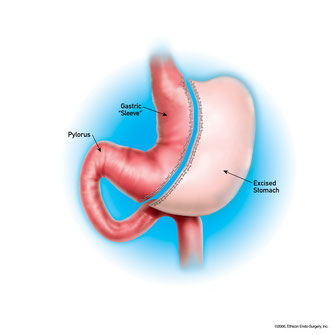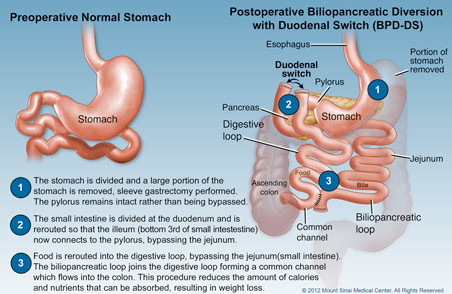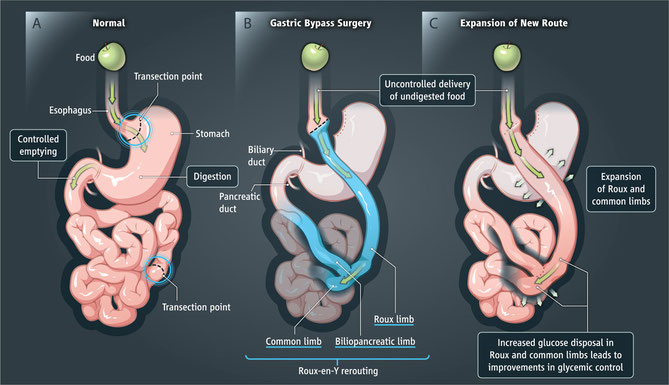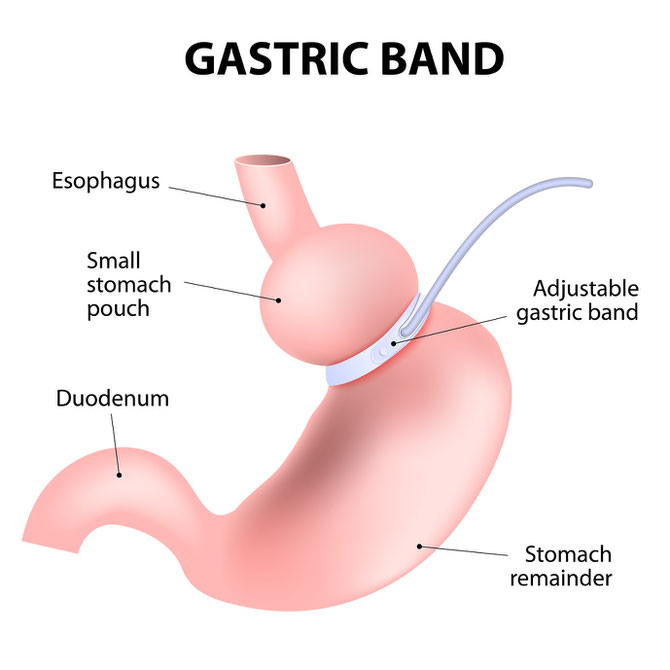Bariatric Surgery
What is bariatric surgery?

Bariatric surgery is a type of weight loss surgery comprised of various procedures performed on people who are obese. This can be done by reducing a patient’s stomach size, removing a portion of the stomach, or by re-routing the small intestines to a smaller stomach pouch.
Types of bariatric surgery?
Gastric band surgery dramatically decreases the size of a patient’s stomach with the utilization of a silicone band. This band prevents over consumption of food typically allowing enough room for one ounce of contents. The band can be adjusted according to how the weight loss progresses. This surgery accounts for approximately 40 percent of weight loss surgeries.
Sleeve Gastrectomy

During sleeve gastrectomy surgery, 60 to 85 percent of the stomach is removed creating the shape of a “sleeve.” This decreases the size of the stomach, but still allows for the proper digestion and absorption of food.
Biliopancreatic Diversion With Duodenal Switch

Biliopancreatic surgery is for patients who are severely obese. It can be done laparoscopically or with traditional open surgery. This surgery is composed of multiple steps to create maximum caloric malabsorption. Firstly, like a sleeve gastrectomy, a large portion of the stomach is removed to prevent the excessive intake of calories by reducing its size. Secondly, the stomach is re-routed to bypass a part of the small intestine decreasing the amount of calories absorbed. Lastly, the flow of bile from the pancreas that assists in the enzymatic breakdown of food is restricted in the duodenum to further caloric malabsorption.
Gastric Bypass

The goal of gastric bypass surgery is to both restrict the stomach size and decrease caloric absorption. Initially, the surgeon restricts the regular size of the stomach by stapling it creating a small pouch. This small pouch becomes the new stomach size and disallows for over consumption of food. Once this is complete, the surgeon then disconnects the stomach from the duodenum, the first part of the small intestine, to the jejunum, the latter part. This decreases calorie and nutrition absorption because majority of this takes place in the duodenum. The surgery is performed laparoscopically and approximately taxes 60 to 90 minutes to perform.
When is bariatric surgery needed?
Recent research recommends immediate bariatric surgery for those with a body mass index (BMI) of 35 to 40. This is indicative of severe obesity and can be beyond detrimental to one’s health. Patients with a BMI of 30 to 35 with significant comorbidities, like diabetes, are highly advised to receive bariatric surgery. Any patient with a BMI over 30 is a candidate for a bariatric operation and should immediately seek medical attention.
Office:
770-502-2150
Fax:
770-502-2103
Billing or Medical Records:
770-683-3532
Address:
775 Poplar Road , Suite 260
Newnan, Georgia 30265
General Surgeons Dr. Clifford A. Cranford Jr., MD, Frank S. Powell, MD and Joseph H. Morris III, MD provide comprehensive surgical care for CPM Advanced Surgical Specialists in Newnan, Georgia. They treat a variety of disorders including but not limited to: general surgery, breast surgery, gastrointestinal endoscopy, laparoscopic surgery and bariatric surgery. We proudly serve Newnan, GA, Peachtree City, GA,Fayetteville, GA and other surrounding cities. Addresses: 775 Poplar Road | Suite 350 | Newnan, GA 30265 Copyright © 2015 CPM Advanced Surgical Specialists - Website by - Registered Vascular Solutions, Inc.


